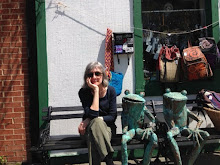Yom Kippur, 2015
After the murder of nine black people in a church in Charleston South Carolina earlier this year, the Sharon clergy hastily called for a vigil in the town center where we would be sure to have hundreds of witnesses driving through the intersection. I stood quietly, holding a small sign.
A little white boy, around seven years old, stepped up to the curb and boldly introduced himself to me. His mom stood a distance apart from us. “I don’t understand how someone could kill other people,” he said to me with some agitation. I agreed that yes, it was difficult to understand. I asked him if he knew what the word racism meant, pointing to one of the signs someone was holding. Yes, he said, he had just learned it. “I hate racism,” he said. But he was concerned about the killer’s safety, also. “Someone might poison his food, I’ve heard that happens sometimes.” He’ll be safe in jail, I replied, until there is a trial. “Oh yes, a trial,” he said, relieved. And then a moment later his mom called out that it was time for them to go.
The Hebrew word malach, often translated as angel, means a messenger. In Jewish folk tradition, seemingly chance encounters with strangers are sometimes understood as offering us important messages. My brief, chance encounter with this open-hearted little boy felt like a message. His caring words reminded me of when I was a child in the 1960s and first became conscious of racial prejudice and bigotry. I remember that sense of moral outrage and sorrow, that sense of “I hate racism.” And now I am 56 years old, and racial prejudice and bigotry are still very much with us.
click here for complete sermon
After the murder of nine black people in a church in Charleston South Carolina earlier this year, the Sharon clergy hastily called for a vigil in the town center where we would be sure to have hundreds of witnesses driving through the intersection. I stood quietly, holding a small sign.
A little white boy, around seven years old, stepped up to the curb and boldly introduced himself to me. His mom stood a distance apart from us. “I don’t understand how someone could kill other people,” he said to me with some agitation. I agreed that yes, it was difficult to understand. I asked him if he knew what the word racism meant, pointing to one of the signs someone was holding. Yes, he said, he had just learned it. “I hate racism,” he said. But he was concerned about the killer’s safety, also. “Someone might poison his food, I’ve heard that happens sometimes.” He’ll be safe in jail, I replied, until there is a trial. “Oh yes, a trial,” he said, relieved. And then a moment later his mom called out that it was time for them to go.
The Hebrew word malach, often translated as angel, means a messenger. In Jewish folk tradition, seemingly chance encounters with strangers are sometimes understood as offering us important messages. My brief, chance encounter with this open-hearted little boy felt like a message. His caring words reminded me of when I was a child in the 1960s and first became conscious of racial prejudice and bigotry. I remember that sense of moral outrage and sorrow, that sense of “I hate racism.” And now I am 56 years old, and racial prejudice and bigotry are still very much with us.
click here for complete sermon
